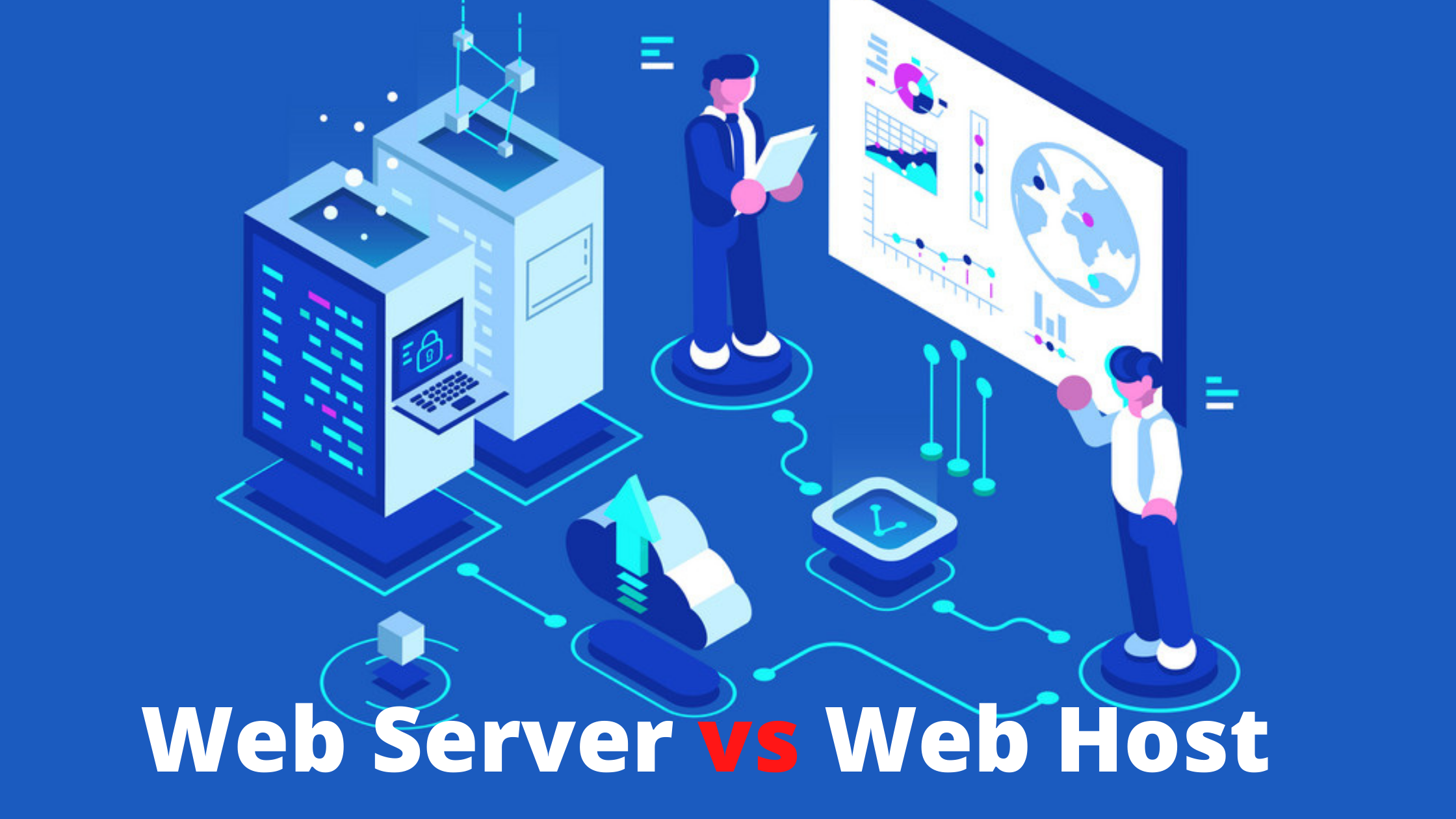Web Server vs WebHost: Differences and Everything you Need to Know
When starting out blogging, one of the terms you encounter frequently is web hosting.
Any website that has an article on starting a blog mentions the world web host or, rather, web hosting. Another term frequent with websites is web server.
When used in the same sentence, they can confuse a beginner. In this article, we will point out the differences between web servers and web hosts.
Web server vs Webhost: Web Server
A web server is a software or primary hardware in a computer system that accepts hypertext transfer protocols requests. As such, a server is a high-tech machine that allows us to access information easily.
A web server communicates with the browser using a transcoder. Also, every web server has its IP address. Furthermore, web servers prevent hackers from gaining access to data on the device or website.
One of the main purposes of a web server is to store, process, and deliver web pages to searchers. Examples of content stored include images, documents, custom style sheets, and other static content.
In addition, a web server supports both simple mail transfer protocol(SMTP) and file transfer protocol(FTP). As such, it will seek, collect, and provide internet if you type the name of a specific URL. Within a few seconds, the web server will provide all the results.
Types of Web servers
Apache HTTP Server
The Apache HTTP server is one of the popular web servers in the world. Its popularity keeps growing because it’s compatible with almost all operating systems.

It’s compatible with Unix, Mac OS, Linux, Apple, Microsoft Windows, and others. Over 60% of all web server machines rely on apache HTTP servers.
One of the reasons it’s popular is because it’s free and open-source software. As such, it is widely accessible to online communities for free.
However, being free, apache HTTP web servers do not provide support to customers. In case of a problem or an error, you’re on your own.
Furthermore, the Apache HTTP web server allows users to customize the server. You can pretty much change everything to your liking.
More so, the recent versions of the Apache HTTP web server are more adaptable and can handle more requests.
Lighttpd
Pronounced as lightly, the Lighttpd web server is not as popular as the apache HTTP and Microsoft IIS. it was released in 2003 and combined “light” and “httpd.”

Despite being less popular, one thing makes it stand out among the rest: its low CPU load and performance.
Lighttpd web server can handle a large number of connections at once.
As a user, you can enjoy awesome features such as HTTP proxy support, servlet support (AJP), flexible virtual hosting, URL rewriting, authentication, and so much more.
Combining these characteristics with the lightweight fact makes Lighttpd web server an excellent choice for web servers that experience loading issues.
Microsoft IIS
If you’re looking for a web server with nearly all the Apache HTTP web server functionalities, then Microsoft IIS is the ideal choice.
However, the Microsoft IIS web server is not free and open source like the Apache HTTP web server.
Since it’s not open source, web developers cannot customize it to meet their project needs. This implies that you’ll have to rework your project to align with the server.
One advantage of using the Microsoft IIS web server is, they provide customer support. If you have problems, you can always contact them for assistance.
Sun Java System Web Server(SJSAS).
SJSAS web server is specifically designed for organizations. It’s a multi-threaded, multiprocess web server that provides users with great dependability, scalability, and performance.
The SJSAS web server provides data security to its users. Users can also enjoy the command line interface (CLI) support. In its recent version, the brand new command-line interface has been named “wadm.”
Despite this, the SJSAS web server does not support the HttpServerAdmin in its latest version( 7.0 webserver).
However, it comes with an inbuilt migration tool that makes transferring configurations, webpages, and apps from earlier versions easy.
Nginx Web Server
It’s an open-source web server written in the Nginx programming language.

It’s much similar to Lighttpd in terms of performance. Also, it requires minimal resources and configuration.
Nginx web server is mostly used for auto-indexing, static file management, load balancing, media streaming, caching, among others.
Rather than generate a separate request for each request made by a user, the Nginx web server uses an asynchronous technique to handle the request as a single thread.
Web server vs Webhost: Web host
A web host is a corporation or organization that provides web hosting services to web admins.
A web host can sell or rent space on a web server. Also, a web host verifies that web servers are in good condition.
A web host is a software that runs on a computer on a greater scale to simplify all this. It provides internet hosting services that let people and businesses access their websites via the world wide web.
A website is hosted when a hosting company allocates room on a webserver to keep its files. It generates the files that make up a website ( code, images, etc.).
A host is the home of every website. Shared, dedicated, VPS, and reseller hosting are the most common types of hosting.
- Dedicated hosting
A single client has access to the private server in this scenario. The server is accessible to the client.
Free hosting allows you to host a small number of websites. It just has a small amount of storage space.
Differences Between Web Server And Web Host?
To avoid confusion between web host and web server, below are the differences.
Webserver
- A computer that is usually used to access the internet.
- Provides computer and other network support.
- It’s where the webserver software is kept.
- Websites are hosted on it.
Web host
- It is the process of hosting a website on a server.
- It enables businesses or individuals to create websites that may be visited via www.
- The internal setup is taken care of by it.
- It allows web pages to be easily accessed over the internet.
Do the terms “webserver” and “web host” have the same meaning?
They are not interchangeable. Each phrase has its definition. The distinction between server and host is designed to protect you and prevent you from making mistakes again.
There is validity in understanding the distinction between a web server and a web host: A web server is a device that runs a website, whereas a web host allows users to access those websites.
The Web server is a device that provides services to other devices through the internet. Web servers, on the other hand, enable businesses to host their websites online.
A web server’s primary function is to store and process data. Many other networks make use of the distinction between them.
The functions of the web server and web host are distinct and must be distinguished. On the one hand, a web server provides services to computers and assists in operating websites.
In contrast, a web host such as Bluehost, HostPinnacle, Hostinger, and HostGator makes websites accessible and hosts them.
Next, explore the best WordPress hosting with a free trial and require no credit cards.


![5 Best VPS Hosting in Kenya [2021] 5 5 Best VPS Hosting in Kenya [2021]](https://bloggingplex.com/wp-content/uploads/2022/04/8-768x432.png)



